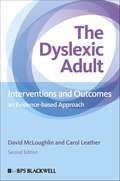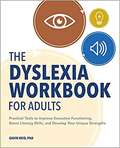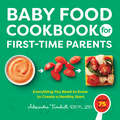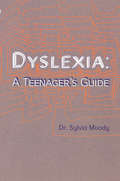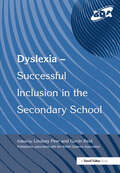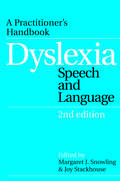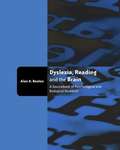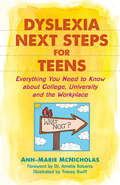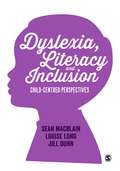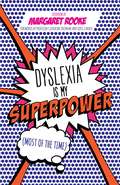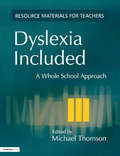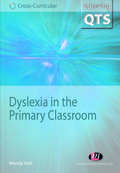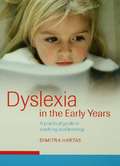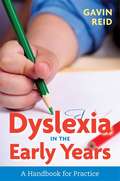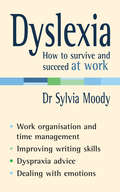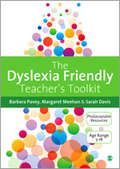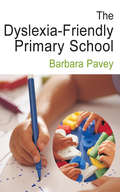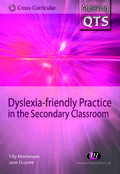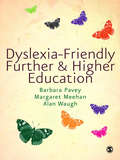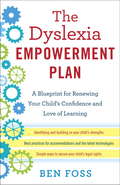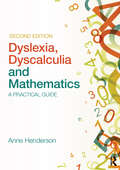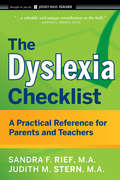- Table View
- List View
The Dyslexic Adult
by Carol Leather David McloughlinA definitive and evidence-based guide for psychologists, teachers, coaches, HR personnel and all professionals who must understand and work with dyslexic adults.The only book to look at dyslexia within the context of life span developmental psychology, including the factors that contribute to success - now fully revised and updatedCombines an accessible style with a strong focus on evidence-based practice and a sound theoretical model on which to base assessment, counselling, teaching and trainingProvides a clear guide to the kinds of assessment that can be conducted and the ways in which dyslexic adults can be supported in selection, training, education and employmentIncludes coverage of overlapping syndromes such as dyspraxia and dyscalculia, and up-to-date check lists for syndromes that can be used as part of the assessment process
The Dyslexia Workbook for Adults: Practical Tools to Improve Executive Functioning, Boost Literacy Skills, and Develop Your Unique Strengths
by Gavin ReidImprove your skills and discover the strengths of your dyslexia―strategies and exercises for adults <P><P> Dyslexia is a continuous, lifelong journey―one that asks you to adapt and grow every day. The Dyslexia Workbook for Adults offers practical tools, techniques, and activities to help you improve your literacy skills, boost your self-esteem, and use your dyslexia as an advantage. <P><P> Gain a sense of empowerment and a greater appreciation for the positive aspects of dyslexia with exercises designed to develop the strengths unique to dyslexic patterns of thinking. Explore specific strategies for targeting problems that adults with dyslexia experience with spelling, reading, writing, memorization, organization, and other executive functioning skills. You’ll come to see your dyslexia as a gift and an important part of you. <P><P> The Dyslexia Workbook for Adults includes: Intro to dyslexia―Learn more about dyslexia and how it impacts adults, and take an assessment of your own experience with the characteristics of dyslexia. Coping strategies―Build resilience to dyslexia-specific stressors in your personal life and the workplace with actionable coping techniques. Dyslexia in action―Read real-life scenarios that depict people with dyslexia using a variety of strategies and employing their strengths to overcome challenges and thrive. Build greater confidence and stronger literacy skills with evidence-based tools and exercises for adults with dyslexia.
Dyslexia Tools Workbook for Teens: 120 Exercises to Improve Reading Skills (Learn to Read for Kids with Dyslexia)
by Jenn Clark Gavin ReidBoost confidence and reading skills with dyslexia tools for teens Reading comprehension is a crucial skill for students to practice, especially students with dyslexia. The Dyslexia Workbook for Teens provides practice and encouragement for kids ages 12 to 16, with 125 activities that focus on learning big words, prefixes and suffixes, word recognition, language fluency, and more. The dyslexia tools in this book support teens as they: Learn independently—Teens can comfortably practice whenever and however they prefer with this collection of dyslexia tools they can work on by themselves. Explore a range of exercises—Keep students interested with word charts, puzzles, fill-in-the-blanks, and other fun activities. Build self-assurance—As teens get better and faster at these exercises, they'll see for themselves how much they're capable of and feel more confident in their reading and language skills. Help middle and high school students in overcoming dyslexia with this book of skill-boosting activities.
Dyslexia: A Teenager's Guide
by Sylvia MoodyDyslexic teenagers face special problems - this book will help solve them. Dyslexia, involving problems with reading, writing, spelling, memory, organisation and time management, can affect people of all backgrounds and abilities. But most books on this subject are geared towards young children; advice for teenagers is thin on the ground. Yet dyslexic teenagers face special problems. They need to master complex study skills, deal with large amounts of revision, and cope with the demands of examinations. They may suffer from stress, anxiety and lack of confidence. Dyslexia: A Teenager's Guide helps young adults tackle these problems with strategies uniquely suited to their needs. Clearly and simply written by a leading expert in the field, the book helps with reading, writing, spelling and memory, as well as giving tips on how to take notes, organise study, deal with examinations and use IT. It also shows how to improve confidence, deal with stress, and build on the creative talent that many dyslexics possess.
Dyslexia-Successful Inclusion in the Secondary School
by David BlunkettIncreasingly dyslexia is becoming a whole-school issue. The responsibility for addressing the needs of dyslexic students no longer rests with one individual but is the responsibility of all school staff - subject specialists and school management. This timely book addresses this need by providing specific guidance to secondary school staff on how to support dyslexic students within different subject areas and within the principles and practices of inclusion.
Dyslexia, Speech and Language
by Joy Stackhouse Margaret J. SnowlingThis authoritative handbook presents current ideas on the relationship between spoken and written language difficulties. It provides clinical and educational perspectives on the assessment and management of children's reading and spelling problems. The book begins with a theoretical overview.The second edition continues the theme of linking theory and practice. It is aimed at practitioners in the fields of education, speech and language therapy, and psychology. All original chapters have been updated and new chapters are added to reflect current developments.
Dyslexia, Reading and the Brain: A Sourcebook of Psychological and Biological Research
by Alan BeatonDespite the wealth of literature available on the subject of dyslexia, there is little that explores the subject beyond a single theoretical framework. The need for a comprehensive review of the literature by both researchers and practitioners from different fields and theoretical backgrounds is the central motivation behind Dyslexia, Reading and the Brain. By combining the existing fragmented and one-sided accounts, Alan Beaton has created a sourcebook that provides the much-needed basis for a more integrated and holistic approach to dyslexia.The book is divided into two sections: the first, The Cognitive Context, outlines the theoretical context of normal reading development and introduces the role of phonological awareness and the relation between dyslexia and IQ. Section two, The Biological Context, provides an explanation of the genetic background as well as exploring hormonal theories and the visual aspects of dyslexia.
Dyslexia Next Steps for Teens: Everything You Need to Know about College, University and the Workplace
by Ann-Marie McNicholasWritten for 14+ year olds, this accessible book empowers young people with dyslexia to make a smooth transition to college, university or the workplace. An engaging and informative guide, it will help you plan and make decisions about the next stage of your education or employment.Ann-Marie McNicholas, who has worked with young people with dyslexia for many years, answers the questions that you will have as you plan for life at university or college. She covers the differences between school and college and university, lists the different types of dyslexia assessment available and gives you simple, tried-and-tested tips to help you to manage your time, your workload and your revision. Beyond information about further and higher education, the book is full of advice on preparing for the next stage in your life, such as moving into the workplace.A must-read pocket guide for teenagers with dyslexia and an essential resource for parents, teachers, SENCOs, career advisers, and anyone else involved in supporting learners with dyslexia to make a successful transition to further education and the world of work.
Dyslexia, Literacy and Inclusion: Child-centred perspectives
by Sean Macblain Dr Jill Dunn Louise LongThis book is about raising standards in literacy for children with dyslexia by putting the child at the centre of everything you do, focusing on wellbeing, and recognising the role that adults have to play in ensuring all children reach their potential. Concentrating on children in primary schools and early years settings the book looks at: Early intervention Pupil voice Working as a team New literacies Child-centred identification, assessment and provision Challenges for the inclusive school. Suitable for all those working with children with dyslexia this book contains strategies that can be easily adopted to academically and emotionally benefit the children you are working with.
Dyslexia, Literacy and Inclusion: Child-centred perspectives
by Sean MacBlain Louise Long Dr Jill DunnThis book is about raising standards in literacy for children with dyslexia by putting the child at the centre of everything you do, focusing on wellbeing, and recognising the role that adults have to play in ensuring all children reach their potential. Concentrating on children in primary schools and early years settings the book looks at: Early intervention Pupil voice Working as a team New literacies Child-centred identification, assessment and provision Challenges for the inclusive school. Suitable for all those working with children with dyslexia this book contains strategies that can be easily adopted to academically and emotionally benefit the children you are working with.
Dyslexia is My Superpower (Most of the Time)
by Margaret RookeIn more than 100 interviews, children and young adults reveal their personal tips and tactics for honing the creative benefits of dyslexia, enabling them to thrive in school and beyond. Strategies include ways to develop confidence and self-belief. The contributors have outlined specific approaches they feel have helped them, and others that haven't. The book contains stunning illustrations by 8-18 year olds with dyslexia.The first-hand accounts are inspiring in the way they normalise dyslexia and reveal the many success stories. There is an additional section for professionals who work in education or special learning environments, with advice given by school students themselves.
Dyslexia Included: A Whole School Approach
by Michael ThomsonThis practical book provides teachers with techniques and suggestions to help dyslexic pupils. Written by a team of experienced practitioners who work in a specialist school, it offers clear guidance and tried and tested strategies to help those who need support in this area. The book addresses reading and spelling difficulties and also other aspects of pupils' learning difficulties, including: accessing the curriculum; dyspraxia and motor development problems; learning mathematics; the use of ICT; developing phonological coding; and understanding dyslexics' behaviour. Teachers and teaching assistants working in specialist and mainstream primary and secondary schools should find the book useful. It is also relevant to those doing specialist courses in dyslexia.
Dyslexia in the Primary Classroom (Achieving QTS Cross-Curricular Strand Series)
by Wendy HallThis book is an important resource for all primary trainees. It provides an explanation of what dyslexia is and how it affects a child’s learning, suggests simple activities which can be used to screen children ready for referral and outlines some easy-to-follow activities addressing different learning styles. It is full of practical suggestions on how to teach reading, spelling and mathematics, develop writing and help with classroom organisation for children displaying difficulties in these areas. The Primary National Strategy is considered throughout and clear links are made to the Professional Standards for the Award of QTS.
Dyslexia in the Early Years: A Practical Guide to Teaching and Learning
by Dimitra HartasPacked full of activities, real-life case studies, tasks and suggestions, this informative book will equip teachers with the kind of practical knowledge needed to teach young children with dyslexia effectively. Tackling the subject in a clear and realistic way, the author encourages teachers to think critically in terms of the changing nature of special educational needs, and teaching and learning in early years. She addresses a variety of classroom issues, such as: assessment and identification of dyslexia summarising and commenting on current debates exploring the links between dyslexia, language, and social and emotional development the most effective instructional methods and teaching styles conducive to supporting pupils with dyslexia in early years settings. In addition the book considers the implications of current research for everyday classroom practice, makes recommendations for employing technologies and for accessing web-based information and resources.
Dyslexia in the Early Years: A Handbook for Practice
by Gavin ReidResearch has shown that early identification and intervention is crucial and can in fact minimise, and may even prevent, the challenges of dyslexia from becoming too detrimental at later stages of education. This book offers both research insights and practical guidance for teachers working in Early Years settings on how to create resource materials that would be suitable for the development of children with dyslexia. Beginning with a contextual note on the key difficulties faced by children at risk of dyslexia, the book takes the reader through the processes of identification and diagnosis, before offering ideas on how to tailor classroom materials for these students. The book's resource materials are designed to target areas such as reading, spelling, numeracy, language skills, social and emotional development, and problem solving skills.
Dyslexia: How to survive and succeed at work
by Sylvia MoodyDyslexic people face many problems in the workplace: difficulties with reading and writing, memory, organisation and time management, and a recent TUC report on dyslexia in the workplace estimates that 3 million people are affected.Dyslexia: How to survive and succeed at work is written by a leading expert in the field for people of all backgrounds and abilities and will help you to master complex organisational skills, deal with a large workload and cope with the demands of deadlines. It also shows how to improve confidence, deal with stress, and build on the creative talent that many dyslexics possess.Dyslexia: How to survive and succeed at work:- Explains what dyslexic and dyspraxic difficulties are- Describes how they affect workplace efficiency- Offers strategies to manage dyslexic difficulties and reduce their adverse effect on work efficiency- Provides information about ways in which employers can help dyslexic employees
The Dyslexia Handbook: Procedures Concerning Dyslexia and Related Disorders
by Texas Education AgencyThe Texas Education Agency (TEA) handbook contains the SBOE-approved procedures concerning dyslexia and related disorders. It provides guidelines for school districts to follow as they identify and provide services for students with dyslexia. Additionally, the handbook provides school districts and parents/guardians with information regarding the state's dyslexia statutes and their relation to these federal laws.
The Dyslexia Handbook: Procedures Concerning Dyslexia and Related Disorders (Revised #2014)
by The Editors at the Texas Education AgencyThe handbook contains the SBOE-approved procedures concerning dyslexia and related disorders.It also provides guidelines for school districts to follow as they identify and provide services for students with dyslexia.
The Dyslexia-Friendly Teacher's Toolkit: Strategies for Teaching Students 3-18
by Barbara Pavey Margaret Meehan Sarah Davis'This book is a really practical, hands-on guide packed woth a wealth of advice on strategies and "things to try" reflecting the authors' extensive experience. If you want to make effective, inclusive dyslexia-friendly classrooms a reality rather than an aspiration, this book is for you'-Dr John P. Rack, Head of Research and Development, Dyslexia Action In this toolkit the authors provide you with the foundations for making your setting and your teaching style dyslexia-friendly. There is a general overview of the principles and practices required, and what the dyslexia-aware teacher needs to bear in mind. Chapters cover: - understanding learners with dyslexia; - dyslexia and phonics; - dyslexia and English as an Additional Language; - dyslexia and mathematics; - dyslexia and science; - dyslexia and creativity. Each chapter includes visual chapter overviews, tried and tested strategies for the classroom and the whole school, using technology to help learners, case studies from practice, children's voices and sources of further information. The book offers you ideas and advice, and will ensure you feel confident you are doing the right things to help overcome barriers to learning. Barbara Pavey is a lecturer in Higher Education, training dyslexia specialists in the North of England. Margaret Meehan is Coordinator of Specialist Tuition at Swansea University Sarah Davis is an Early Years Leading Teacher working in North Yorkshire
The Dyslexia-Friendly Primary School: A Practical Guide for Teachers
by Barbara PaveyIs your school dyslexia-friendly? Beginning with a look at understanding dyslexia, this book shows you how to involve the whole school in order to achieve a dyslexia-friendly environment. You will be able to: - use an audit tool to discover how dyslexia-friendly your school is - look at examples of successful dyslexia-friendly initiatives - find information on funding and resources. This book offers a step-by-step guide to creating a dyslexia-friendly classroom and whole-school environment. Headteachers, deputy headteachers, class teachers, SENCOs, student teachers and literacy co-ordinators wanting to make their school more dyslexia-friendly will find this practical book extremely useful. Barbara Pavey worked as a teacher and SEN specialist for many years and is now Lecturer in Learning Disabilities at The University of Manchester.
Dyslexia-friendly Practice in the Secondary Classroom (Achieving Qts Cross-curricular Strand Ser.)
by Tilly Mortimore Jane DupreeThe first guide of its kind written specifically for trainee and newly qualified teachers, this standards-based text explores the needs of dyslexic learners in mainstream secondary schools. In light of the current dyslexia-friendly schools initiative, it looks at organisational-level support for dyslexic children, together with pragmatic strategies which teachers can use to support children's cross-curricular learning. Further, it includes case studies and practical tasks to build readers' confidence in supporting Specific Learning Difficulties, as well as a range of coping strategies and practical advice, based upon the authors' experience of working with dyslexic learners in different contexts over many years.
Dyslexia-Friendly Further and Higher Education
by Barbara Pavey Margaret Meehan Alan WaughWritten by authors with extensive experience of working with students with dyslexia, this book provides clear guidance and practical strategies for dyslexia-friendly practice for those working with young people aged 14 to 19 and adults in education or work-based training. Looking at how dyslexia impacts on learning, the authors suggest ways to improve the learning environment and explain how to help students develop the basic skills that will help them to make the transition from study to employment. Building on the latest research and understanding of dyslexia, they also consider overlapping characteristics, emotional and social issues and funding. The book includes: - visual chapter summaries - case studies drawn from practice - ideas for dyslexia-friendly written work, and lab and bench work - international perspectives - a selection of resources - model lesson plans and useful checklists This is essential reading not only for those studying dyslexia-focused programmes at Master's level, but also for mainstream practitioners wishing to improve their dyslexia knowledge and practice, and an ideal resource for professionals working in a school, college, university or adult setting, or delivering training and consultancy in this field. Barbara Pavey is a Senior Lecturer in Education at York St John University. Margaret Meehan is the Dyslexia Coordinator at Swansea University. Alan Waugh is Programme Area Manager for Additional Support at City College, Coventry.
The Dyslexia Empowerment Plan
by Ben FossFinally, a groundbreaking book that reveals what your dyslexic child is experiencing--and what you can do so that he or she will thrive More than thirty million people in the United States are dyslexic--a brain-based genetic trait, often labeled as a "learning disability" or "learning difference," that makes interpreting text and reading difficult. Yet even though children with dyslexia may have trouble reading, they don't have any problems learning; dyslexia has nothing to do with a lack of intellect. While other books tell you what dyslexia is, this book tells you what to do. Dyslexics' innate skills, which may include verbal, social, spatial, kinesthetic, visual, mathematical, or musical abilities, are their unique key to acquiring knowledge. Figuring out where their individual strengths lie, and then harnessing these skills, offers an entrée into learning and excelling. And by keeping the focus on learning, not on standard reading the same way everyone else does, a child with dyslexia can and will develop the self-confidence to flourish in the classroom and beyond. After years of battling with a school system that did not understand his dyslexia and the shame that accompanied it, renowned activist and entrepreneur Ben Foss is not only open about his dyslexia, he is proud of it. In The Dyslexia Empowerment Plan he shares his personal triumphs and failures so that you can learn from his experiences, and provides a three-step approach for success: * Identify your child's profile: By mapping your child's strengths and weaknesses and assisting her to better understand who she is, you can help your child move away from shame and feelings of inadequacy and move toward creating a powerful program for learning. * Help your child help himself: Coach your child to become his own best advocate by developing resiliency, confidence, and self-awareness, and focusing on achievable goals in areas that matter most to him. * Create community: Dyslexic children are not broken, but too often the system designed to educate them is. Dare to change your school so that your child has the resources to thrive. Understanding your rights and finding allies will make you and your child feel connected and no longer alone. Packed with practical ideas and strategies dyslexic children need for excelling in school and in life, this empowering guide provides the framework for charting a future for your child that is bright with hope and unlimited potential.Advance praise for The Dyslexia Empowerment Plan "I study dyslexia in the lab and am a parent of a wonderful daughter who fits this profile. Ben Foss's book should be considered essential to any collection on the subject. It was extremely useful, especially for a mom. Thank you!"--Maria Luisa Gorno Tempini, M.D., Ph.D., professor of neurology, UCSF, Memory and Aging Center "As someone with a learning profile that made school tough, and as a parent, I know kids need the right support. Ben Foss knows how to get access to education because he's been through it. I was thrilled to read this book. It offers a wise collection of insights that are both practical and touching. Buy it today if you want a get a plan for your child."--James Gandolfini, actor, The Sopranos
Dyslexia, Dyscalculia and Mathematics: A practical guide
by Anne HendersonDyslexia, Dyscalculia and Mathematics will be an essential resource for teachers, classroom assistants, and SENCOs who help dyslexic and dyscalculic children with their understanding of mathematics. Written in an accessible style with helpful illustrations, this practical book reveals helpful ways in which to tackle both simple and complex concepts with students of all ages. This second edition has been updated to include references to using technology that will help children with dyslexia and dyscalculia reinforce their mathematical skills and also contains a number of photocopiable resources that can be used in the classroom. Written by Anne Henderson, who is experienced in teaching language and mathematics to pupils with dyslexia and dyscalculia, this book outlines current thinking in the field and shows how the research methods that have been proven as successful can be used with whole classes of children. This book encourages flexible methods and gives teachers the confidence to discuss alternative solutions with their pupils and help them achieve success. It is an ideal handbook for parent-teacher programmes and is also suitable for in-service training.
The Dyslexia Checklist
by Judith Stern M.A. Sandra F. RiefEssential advice and resources for helping kids with dyslexiaThe Dyslexia Checklist is a valuable guide for parents and teachers that can help them better understand children and teenagers with dyslexia and other reading- and language-based disabilities. The book relays the most current research available and is filled with practical strategies, supports, and interventions. Using these tools teachers and parents can accommodate the needs and strengthen the skills of students with reading and writing disabilities across all age levels. The book is presented in a simple, concise, easy-to-read checklist format and is filled with useful advice and information on a wide range of topics.Explains what we now know about dyslexia from decades of researchContains games to strengthen a child's literacy and language skillsProvides important information for hooking in reluctant and struggling readersOffers suggestions for enhancing skills in vocabulary, comprehension, composition and written expression, spelling, math, and moreThe book also provides information on the educational rights of students with dyslexia.
